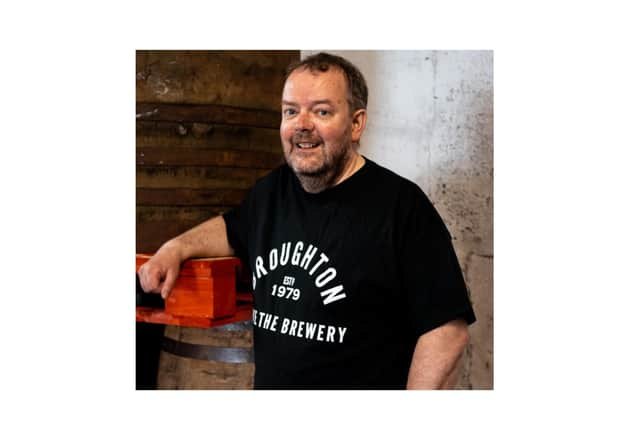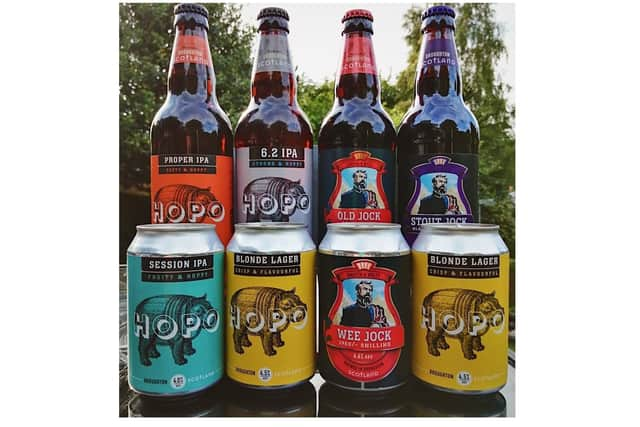Broughton Ales, Scotland’s first independent brewery, targets ambitious growth plans


It was bought in late 2015 by a group including directors David McGowan and John Hunt who have decades of experience in the brewing and drinks industries from working for leading brands, including Heineken and Diageo.
Since then, Broughton Ale’s branded sales have grown by more than 200% to hit £1.25 million, and the ambitious owners have a target of reaching £10m in the next three years.
The business is now offering others the chance to be part of its success as it looks to attract a seven figure investment.


David McGowan explains how Broughton Ales has grown and its future plans.
Q What is the history of Broughton Ales and why did you buy the business in 2015?
A It was originally set up as Scotland’s first independent, craft brewery by David Younger, of the Younger brewing dynasty, and James Collins. They had the foresight to know people were looking for authentic, original and locally-produced products.
We’re passionate about beer and saw an opportunity to bring our commercial skills to a brewery that had strong brands, a good reputation and a solid base.
Q How have you changed the business?
A We’ve focused on quality, marketing and the sales operation to get our products to more people through pubs, supermarkets and, recently, online.
We have a clear focus around who drinks our beers. Our flagship Old Jock, a traditional Scottish style beer, and recently launched Wee Jock, appeal to a male, 35+ audience who like malt whisky and stronger tasting products. Our HOPO range tends to be for a younger 25+ market of males and females looking for products that are local, authentic and little bit different.
Q How has the pandemic and Brexit affected you?
A It’s been a challenging time for the industry, but we have good beers and a loyal audience, so we just had to think creatively.
Our supermarket business, that includes a presence in Tesco, Sainsbury’s, Asda, Aldi, Lidl, Morrison’s, Nisa and Co-Op, has performed well. We’ve also invested in our online sales and they are now the same size as our pub sales were before lockdown. The online success has given us even more confidence to innovate and diversify into new channels and we are ready for the re-opening of hospitality.
We’ve been investing in new pack formats and types of beer. We have four canned beers, up from one at the start of lockdown. We have barrel-aged products, gluten-free lager and more recently we’ve launched non-alcoholic beers. Sales of our Old Jock were up 25% year-on year, against a beer market that’s down 18%.
There are big opportunities for a small business like ours which can be quick and slick. And we’re touched by the amount of affection for us.
We’ve risen to the challenges of Brexit. We’ve recently shipped our first export to Romania, and we expect export to grow substantially in the next three years.
Q Describe your approach to innovation and sustainability?
A One example is our decision to put QR codes onto our bottle tops that take people to a site where we have a list of beer cocktails, which are growing in popularity. The company that produces the bottle tops they said we were the first in the country to put QR codes on bottle tops - we’re proud of that innovation.
Since almost day one at Broughton, we’ve been taking the spent grain from our production process and selling it to the local farmer to feed his cattle. In an exciting development, we’re now talking to Scottish Enterprise about whether we could recover energy from that spent grain to power the brewery.
We’ve also planted 50 trees on our land, and plan to plant more. It’s important that we do out bit for the community, locally and globally.
Q Why are you looking to raise equity from investors now?
A We want to take Scotland’s original craft beers to an even wider audience.
With the easing of lockdown and local and global economies re-opening, we believe we have a good platform for growth around strong brands that are outperforming the market.
We have a great story around provenance and authenticity, track record of growth and a strong management team.
Beer production is sustainable – it’s been around in Scotland for 800 years. In terms of a market that’s going to be around in a few hundred years you can put a big tick against beer.
We plan to invest in quality, sales, marketing, production output and people and add to our headcount of 11 employees.
We’ll target new markets. We see big commercial opportunities in other parts of Scotland, including the west of the country where we believe we can grow, we are selling more into England, and in North America where we can tap into the Scottish diaspora.
To find out more please contact David McGowan, director, on director@broughtonbrewery.co.uk or visit https://broughtonales.co.uk